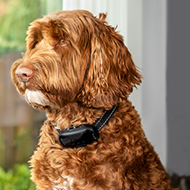
The organisation has written to Defra to ensure commitments are put into action.
The Kennel Club has written to Defra minister Zac Goldsmith calling for swift action on a ban on the use of electric shock collars in England.
It follows a Court of Judgement decision reached last week to dismiss the appeal of the Electronic Collar Manufacturers Association and Petsafe Ltd.
The appeal - which previously delayed DEFRA from bringing about any legislative action - was thrown out after ministers presented evidence to show that electric shock collars can have a detrimental effect on dog welfare.
It also follows the launch of the government’s new Action Plan for Animal Welfare on 12 May, which includes a ban on the use of electric shock collars – a move that has been long-championed by the Kennel Club.
Dr Ed Hayes, head of public affairs at The Kennel Club, said: “The Court of Appeal judgment should be the final step on this hard-fought path to ban the use of electric shock collars in England and we have written to the Minister to urge that the strong words and commitments made are swiftly converted into action.
“We are delighted that the government has committed to banning these unnecessary and cruel devices in their action plan; research demonstrates that a reward-based approach is more effective than delivering painful electric shocks when training dogs and leading veterinary bodies in the UK and Europe are aligned in their opposition against shock collars."
He continued: “We have been extensively lobbying the UK Government and the devolved administrations for years on this issue. The Government previously committed to banning these harmful devices however the legal challenge, which has now finally been brought to a close, had considerably delayed DEFRA from acting. There is now no room to lose the forward momentum in bringing about the ban.”



 The latest
The latest